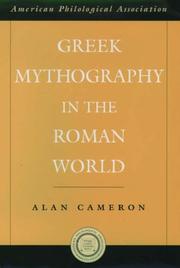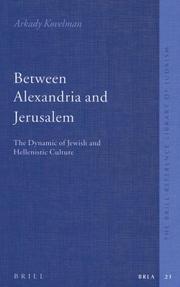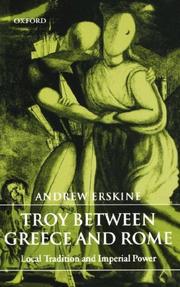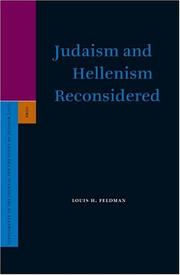| Listing 1 - 10 of 11 | << page >> |
Sort by
|
Book
ISBN: 9781107032422 1107032423 9781139505987 1316625702 113989241X 1107779510 1107780012 110778445X 1107781256 113950598X 1107778743 1107784913 9781107784451 9781107777019 1107777011 1306459354 9781306459358 9781107780019 9781107781252 9781107779518 9781107778740 9781107784918 Year: 2013 Publisher: Cambridge New York
Abstract | Keywords | Export | Availability | Bookmark
 Loading...
Loading...Choose an application
- Reference Manager
- EndNote
- RefWorks (Direct export to RefWorks)
Although the Hellenistic period has become increasingly popular in research and teaching in recent years, the western Mediterranean is rarely considered part of the 'Hellenistic world'; instead the cities, peoples and kingdoms of the West are usually only discussed insofar as they relate to Rome. This book contends that the rift between the 'Greek East' and the 'Roman West' is more a product of the traditional separation of Roman and Greek history than a reflection of the Hellenistic-period Mediterranean, which was a strongly interconnected cultural and economic zone, with the rising Roman republic just one among many powers in the region, east and west. The contributors argue for a dynamic reading of the economy, politics and history of the central and western Mediterranean beyond Rome, and in doing so problematise the concepts of 'East', 'West' and 'Hellenistic' itself.
Greeks. --- Hellenismus. --- Civilisation hellénistique. --- To 476. --- Mittelmeerraum --- Hellenism --- Greeks --- History --- Colonization --- Mediterranean Region --- Civilization --- Greek influences --- Colonisation --- Hellenism. --- Greek influences. --- Colonization. --- History. --- Mediterranean Region. --- Méditerranée (région) --- Civilisation. --- Hellénisme --- Grecs --- Histoire --- Méditerranée, Région de la --- Civilisation --- Arts and Humanities --- Hellenism - History --- Greeks - Mediterranean Region - History --- Greeks - Colonization - Mediterranean Region --- Mediterranean Region - Civilization - Greek influences --- Mediterranean Region - History - To 476 --- Ethnology --- Mediterranean race --- Greece

ISBN: 0195171217 0190291095 1423720652 0198038216 1280427825 1602564787 9780195171211 9780198038214 9781423720652 9781280427824 9786610427826 6610427828 9780190291099 9781602564787 0197704646 Year: 2004 Volume: 48 Publisher: Oxford Oxford university press
Abstract | Keywords | Export | Availability | Bookmark
 Loading...
Loading...Choose an application
- Reference Manager
- EndNote
- RefWorks (Direct export to RefWorks)
Illustrating the importance of semi-learned mythographic handbooks in the social, literary, & artistic world of Rome, this volume examines the importance of Greek mythology to the Roman �elite, long after the stories had ceased to reflect popular culture.
Latin literature --- Mythology, Greek, in literature --- Mythology, Greek --- Greek influences --- History and criticism --- Historiography --- Rome --- Civilization --- Greek influences. --- Greek mythology in literature --- Griekse mythologie in de literatuur --- Mythologie [Griekse ] in de literatuur --- Mythologie grecque dans la littérature --- Mythology [Greek ] in literature --- Mythology, Greek, in literature. --- Littérature latine --- Mythologie grecque --- Mythologie grecque dans la littérature --- History and criticism. --- Influence grecque --- Histoire et critique --- Historiographie --- Civilisation --- Greek mythology --- Roman literature --- Classical literature --- Classical philology --- Latin philology --- Greece --- Mythology [Greek ] --- Historiography. --- Latin literature - Greek influences --- Latin literature - History and criticism --- Mythology, Greek - Historiography --- Rome - Civilization - Greek influences.

ISSN: 15715000 ISBN: 9004144021 9786610868131 1429453117 1280868139 1433704951 9789004144026 Year: 2005 Volume: 21 Publisher: Leiden Boston : Brill,
Abstract | Keywords | Export | Availability | Bookmark
 Loading...
Loading...Choose an application
- Reference Manager
- EndNote
- RefWorks (Direct export to RefWorks)
The book exhibits the dynamics of Jewish culture from Alexandrian exegesis to the Talmud in the framework of literary revolutions. These revolutions followed the crisis of tradition and the appearance of 'mass society' in Late Antiquity.
Jews --- Hellenism. --- Rabbinical literature --- History --- Civilization --- Greek influences. --- History and criticism. --- Civilization. --- Civilisation grecque antique --- Hellenism --- Hellenisme --- Hellénisme --- Hellénisme antique --- 568 B.C.-70 A.D. --- 70-638 --- Greek influences --- History and criticism --- Rome --- Jews - History - 586 B.C.-70 A.D. --- Jews - History - 70-638. --- Jews - Civilization - Greek influences. --- Rabbinical literature - History and criticism. --- Jews - Rome - Civilization. --- Juifs --- Littérature rabbinique --- Civilisation --- Histoire et critique --- Influence hellénistique --- Hebrews --- Israelites --- Jewish people --- Jewry --- Judaic people --- Judaists --- Ethnology --- Religious adherents --- Semites --- Judaism --- Hellenistic Judaism --- Judaism, Hellenistic

ISBN: 1280446471 9786610446476 0191553794 1423786122 9781423786122 9781280446474 6610446474 0199240337 9780199240333 9780191553790 0199265801 1383037256 Year: 2001 Publisher: Oxford Oxford university press
Abstract | Keywords | Export | Availability | Bookmark
 Loading...
Loading...Choose an application
- Reference Manager
- EndNote
- RefWorks (Direct export to RefWorks)
Andrew Erskine examines the role and status of Troy in the changing relationship between Greeks and Romans. He assesses the significance of Rome's Trojan origins for the Greeks by considering the place of Troy and Trojans in Greek culture.
Trojan War. --- Mythology, Roman. --- Trojan War --- Mythology, Roman --- Greece --- Regions & Countries - Europe --- History & Archaeology --- Roman mythology --- Mythology, Greek --- Troy (Extinct city) --- Rome --- Ilion (Extinct city) --- Ilium (Extinct city) --- Troia (Extinct city) --- Troja (Extinct city) --- Trovaharabesi (Extinct city) --- Troy (Ancient city) --- Turkey --- History --- Civilization --- Greek influences. --- Antiquities --- Guerre de Troie --- Mythologie romaine --- Troie (Ville ancienne) --- Grèce --- Histoire --- Civilisation --- Influence grecque --- Greek influences --- Mythology [Roman ] --- To 510 B.C. --- To 146 B.C. --- Rome - History - To 510 B.C. --- Rome - Civilization - Greek influences --- Greece - Civilization - To 146 B.C. --- Civilization (Classical) --- Relations
Book
ISSN: 18616003 ISBN: 9783110205039 3110205033 9786611990770 1281990779 3110211122 9783110211122 Year: 2008 Publisher: Berlin de Gruyter
Abstract | Keywords | Export | Availability | Bookmark
 Loading...
Loading...Choose an application
- Reference Manager
- EndNote
- RefWorks (Direct export to RefWorks)
During the past few decades a great amount of scholarly work has been done on the various prayer cultures of antiquity, both Graeco-Roman and Jewish and Christian. In Jewish studies this burgeoning research on ancient prayer has been stimulated particularly by the many new prayer texts found at Qumran, which have shed new light on several long-standing problems. The present volume intends to make a new contribution to the ongoing scholarly debate on ancient Jewish prayer texts by focusing on a limited set of prayer texts, scil. , a small number of those that have been preserved only in Greek. Jewish prayers in Greek tend to be undervalued, which is regrettable because these prayers shed light on sometimes striking aspects of early Jewish spirituality in the centuries around the turn of the era. In this volume twelve such prayers have been collected, translated, and provided with an extensive historical and philological commentary. They have been preserved on papyrus, on stone, and as part of Christian church orders into which some of them have been incorporated in a christianized from. For that reason these prayers are of great interest to scholars of both early Judaism and ancient Christianity.
Judaism --- Greek literature --- Prayer --- Jews --- Liturgy --- History and criticism. --- Jewish authors --- History --- Judaism. --- Civilization --- Greek influences. --- 296*517 --- Hellenistic Judaism --- Judaism, Hellenistic --- Prayer (Judaism) --- Religions --- Semites --- Specifieke joodse gebeden (genre's): Beracha, 18-gebed--, enz. --- Religion --- Greek literature. --- Greek literature --Jewish authors --History and criticism. --- Jews. --- Jews --Civilization --Greek influences. --- Judaism --History --Post-exilic period, 586 B.C.-210 A.D. --- Judaism --Liturgy --Texts --History and criticism. --- Judaism --Prayers and devotions --History and criticism. --- Prayer. --- Prayer --Judaism. --- Philosophy & Religion --- History and criticism --- Greek influences --- 296*517 Specifieke joodse gebeden (genre's): Beracha, 18-gebed--, enz. --- Hebrews --- Israelites --- Jewish people --- Jewry --- Judaic people --- Judaists --- Ethnology --- Religious adherents --- Balkan literature --- Byzantine literature --- Classical literature --- Classical philology --- Greek philology --- Jewish authors&delete& --- Civilization&delete& --- Liturgy&delete& --- Specifieke joodse gebeden (genre's): Beracha, 18-gebed--, enz --- Texts --- Judaism - Liturgy - Texts - History and criticism. --- Greek literature - Jewish authors - History and criticism. --- Judaism - Prayers and devotions - History and criticism. --- Judaism - History - Post-exilic period, 586 B.C.-210 A.D. --- Prayer - Judaism. --- Jews - Civilization - Greek influences. --- Jewish Prayers. --- Jewish Spirituality.

ISBN: 2903189250 2903189285 2918887463 9782903189280 2918887471 9782903189105 2903189102 9782903189259 2918887439 Year: 1986 Volume: 10 Publisher: Naples : Centre Jean Bérard,
Abstract | Keywords | Export | Availability | Bookmark
 Loading...
Loading...Choose an application
- Reference Manager
- EndNote
- RefWorks (Direct export to RefWorks)
Du simple inventaire des documents relatifs au culte d’Héraclès en Sicile se dégagent tout à la fois le sentiment de son rôle tout particulier et de la complexité de sa fonction, de son rituel et de ses origines. On le retrouve aux confins mêmes de la zone grecque, sur l’acropole de Sélinonte et dans le sanctuaire/frontière de Poggioreale, où une inscription archaïque atteste la présence de son sanctuaire. Il pénètre enfin en territoire « barbare », jusqu’à Erix, il introduit le culte d’Aphrodite, s’identifie au dieu phénicien Melkart et se trouve installé dans la plus forte des positions puniques. Une étude plus approfondie devrait pouvoir préciser les premières manifestations de sa puissance et les origines de l’extension du culte divin en Sicile. La rapidité de cette action et ses caractères laissent supposer qu’il faut, selon les régions, faire appel aux deux sources de ce culte que nous avons formulées antérieurement, les origines crétoises et les apports phéniciens. C’est là tout un domaine de la protohistoire religieuse de la Sicile qu’il convient d’explorer et de préciser.
Religion --- Philosophy & Religion --- European Religions - pre-Christian --- Gods, Greek --- 292.211 --- Greek gods --- Religion Classical Greek and Roman Gods, goddesses, divinities and deities --- Greece --- Religion. --- Gods, Greek. --- Excavations (Archaeology) --- Temple of Aphrodite (Akrai) --- Syracuse (Italy : Province) --- Sicily (Italy) --- Antiquities. --- Civilization --- Greek influences. --- Temple of Aphrodite (Akrai). --- 722.809378 --- Arts Architecture Greek ancient world Italy Sicily and Malta --- Greek influences --- Religious life and customs. --- Colonies --- al-Yūnān --- Ancient Greece --- Ellada --- Ellas --- Ellēnikē Dēmokratia --- Elliniki Dimokratia --- Grčija --- Grèce --- Grecia --- Gret︠s︡ii︠a︡ --- Griechenland --- Hellada --- Hellas --- Hellenic Republic --- Hellēnikē Dēmokratia --- Kingdom of Greece --- République hellénique --- Royaume de Grèce --- Vasileion tēs Hellados --- Xila --- Yaṿan --- Yūnān --- Ελληνική Δημοκρατία --- Ελλάς --- Ελλάδα --- Греция --- اليونان --- يونان --- 希腊 --- Greece - Religion --- Sicily (Italy) - Civilization - Greek influences --- Archaeology --- archeologia --- tempio di Afrodite --- Akrai --- Italie --- Religion grecque --- Grande Grèce --- cultes --- Grèce ancienne
Book
ISSN: 01679732 ISBN: 1283161362 9786613161369 9004203508 9789004203501 9789004201712 9004201718 9781283161367 Year: 2011 Volume: 140 Publisher: Leiden Boston Brill
Abstract | Keywords | Export | Availability | Bookmark
 Loading...
Loading...Choose an application
- Reference Manager
- EndNote
- RefWorks (Direct export to RefWorks)
Entering the debate about the development of Christology among Jesus' earliest followers, this volume critiques both the traditional evolutionary view that posited an elementary early Jewish Christology that developed in complexity as it was increasingly Hellenized and the more recent attempt to see a full-orbed Christology both as early and as Jewish, not Hellenistic, in its categories. It contends that during the first 100 years Jesus' followers employed four models from their milieu, Jewish and Greco-Roman, both to understand and to communicate their Christologies. These models were appropriated because they were appropriate vehicles for expressing the impact of Jesus on them, past, present, and future.
Greek literature - Relation to the New Testament. --- Jesus Christ -- Historicity. --- Jesus Christ -- History of doctrines -- Early church, ca. 30-600. --- Jesus Christ -- History of doctrines. --- Jesus Christ - Person and offices - Biblical teaching. --- Jews - Civilization - Greek influences. --- Jews --- Greek literature --- Religion --- Philosophy & Religion --- Christianity --- Civilization --- Greek influences --- Relation to the New Testament --- Greek influences. --- Relation to the New Testament. --- Jesus Christ --- History of doctrines --- Person and offices --- Biblical teaching. --- Hellenistic Judaism --- Judaism, Hellenistic --- Christ --- Cristo --- Jezus Chrystus --- Jesus Cristo --- Jesus, --- Jezus --- Christ, Jesus --- Yeh-su --- Masīḥ --- Khristos --- Gesù --- Christo --- Yeshua --- Chrystus --- Gesú Cristo --- Ježíš --- Isa, --- Nabi Isa --- Isa Al-Masih --- Al-Masih, Isa --- Masih, Isa Al --- -Jesus, --- Jesucristo --- Yesu --- Yeh-su Chi-tu --- Iēsous --- Iēsous Christos --- Iēsous, --- Kʻristos --- Hisus Kʻristos --- Christos --- Jesuo --- Yeshuʻa ben Yosef --- Yeshua ben Yoseph --- Iisus --- Iisus Khristos --- Jeschua ben Joseph --- Ieso Kriʻste --- Yesus --- Kristus --- ישו --- ישו הנוצרי --- ישו הנצרי --- ישוע --- ישוע בן יוסף --- المسيح --- مسيح --- يسوع المسيح --- 耶稣 --- 耶稣基督 --- 예수그리스도 --- Jíizis --- Yéshoua --- Iėsu̇s --- Khrist Iėsu̇s --- عيسىٰ --- Bible and literature --- عيسىٰ --- Juifs --- Littérature grecque --- Civilisation --- Influence grecque --- Relation avec le Nouveau Testament --- 225*2 --- 232 --- Hebrews --- Israelites --- Jewish people --- Jewry --- Judaic people --- Judaists --- Ethnology --- Religious adherents --- Semites --- Judaism --- 225*2 Jezus Christus in het Nieuwe Testament: christologie --- Jezus Christus in het Nieuwe Testament: christologie --- Civilization&delete& --- Jezus Christus. Christologie: dogmatisch. De Verbo incarnato --- Jesus Christ - History of doctrines - Early church, ca. 30-600.
Book
ISBN: 9781107012059 9780511997808 0511997809 9781107249974 110724997X 1107012058 9781107248311 1107248310 9781108456531 1108456537 1139888420 1107241197 1107250803 1107247489 1107249147 1299841724 Year: 2013 Volume: *21 Publisher: Cambridge New York
Abstract | Keywords | Export | Availability | Bookmark
 Loading...
Loading...Choose an application
- Reference Manager
- EndNote
- RefWorks (Direct export to RefWorks)
By engaging with recent developments in the study of empires, this book examines how inhabitants of Roman imperial Syria reinvented expressions and experiences of Greek, Roman and Syrian identification. It demonstrates how the organization of Greek communities and a peer polity network extending citizenship to ethnic Syrians generated new semiotic frameworks for the performance of Greekness and Syrianness. Within these, Syria's inhabitants reoriented and interwove idioms of diverse cultural origins, including those from the Near East, to express Greek, Roman and Syrian identifications in innovative and complex ways. While exploring a vast array of written and material sources, the book thus posits that Greekness and Syrianness were constantly shifting and transforming categories, and it critiques many assumptions that govern how scholars of antiquity often conceive of Roman imperial Greek identity, ethnicity and culture in the Roman Near East, and processes of 'hybridity' or similar concepts.
Identity (Psychology) --- Group identity --- Identité (Psychologie) --- Identité collective --- History --- Histoire --- Syria --- Syrie --- Civilization --- Greek influences --- Roman influences --- Civilisation --- Influence grecque --- Influence romaine --- Greek influences. --- Roman influences. --- Identité (Psychologie) --- Identité collective --- Collective identity --- Community identity --- Cultural identity --- Social identity --- Social psychology --- Collective memory --- Personal identity --- Personality --- Self --- Ego (Psychology) --- Individuality --- Sirii︠a︡ --- Iqlīm al-Sūrī (United Arab Republic) --- Iqlīm al-Shamālī (United Arab Republic) --- Syrian Region (United Arab Republic) --- سوريا --- Sūriyā --- Jumhūrīyah al-ʻArabīyah al-Sūrīyah --- Syrian Arab Republic --- République arabe syrienne --- Sowria --- R.A.S. --- RAS --- Ittiḥād al-Duwal al-Sūrīyah --- Fédération des États de Syrie --- Syrische Arabische Republik --- SAR --- Suryah --- Arabska Republika Syryjska --- Syrien --- Jumhuriya al-Arabya as-Suriya --- Repubblica Araba Siriana --- جمهورية العربية السورية --- Jumhūriyyah al-ʻArabiyyah as-Sūriyyah --- Сірыя --- Siryi︠a︡ --- Сірыйская Арабская Рэспубліка --- Siryĭskai︠a︡ Arabskai︠a︡ Rėspublika --- Сирийската арабска република --- Siriĭskata arabska republika --- Συρία --- Αραβική Δημοκρατία της Συρίας --- Aravikē Dēmokratia tēs Syrias --- 시리아 --- Siria --- סוריה --- רפובליקה הערבית הסורית --- Republiḳah ha-ʻArvit ha-Surit --- シリア --- Shiria --- Сирия --- Сирийская Арабская Республика --- Siriĭskai︠a︡ Arabskai︠a︡ Respublika --- Сирія --- Syrii︠a︡ --- Сирійська Арабська республіка --- Syriĭsʹka Arabsʹka respublika --- 敘利亞 --- Xuliya --- United Arab Republic --- Arts and Humanities --- Identity (Psychology) - Syria - History - to 1500 --- Group identity - Syria - History - to 1500 --- Syria - History - 333 B.C.-634 A.D. --- Syria - Civilization - Greek influences --- Syria - Civilization - Roman influences
Book
ISSN: 09208607 ISBN: 9004338047 9789004338043 9789004338036 9004338039 Year: 2017 Volume: 264 Publisher: Leiden Boston
Abstract | Keywords | Export | Availability | Bookmark
 Loading...
Loading...Choose an application
- Reference Manager
- EndNote
- RefWorks (Direct export to RefWorks)
The beginning of the Greek revival in the West is generally attributed to the teaching of the Byzantine scholar Manuel Chrysoloras in Florence between 1397 and 1400. Causes, aspects, and consequences of this important cultural phenomenon still need to be analyzed in depth. The essays collected in this volume examine the development of the study of Greek from the fifteenth to the early sixteenth century, reconstructing its spread and impact on early modern literatures, philosophy, and visual arts. An analysis of the methods and tools used to teach and learn Greek sheds light on the complex cultural relationships between Byzantium and the West and enlarges the traditional picture of the Greek revival in early modern Europe. Contributors are: Lilia Campana, Federica Ciccolella, Mariarosa Cortesi, Francesco G. Giannachi, Fevronia Nousia, Kalle Lundahl, Erika Nuti, Denis Robichaud, Antonio Rollo, Luigi Silvano, David Speranzi, and Paola Tomé.
Greek philology --- Renaissance --- Humanists --- Civilization --- Humanists. --- Intellectual life. --- Renaissance. --- Revival of letters --- History, Modern --- Civilization, Medieval --- Civilization, Modern --- Humanism --- Middle Ages --- Cultural life --- Culture --- Scholars --- Classical philology --- Greek language --- Greek literature --- Study and teaching --- History. --- Greek influences. --- Study and teaching. --- History --- 1268-1559 --- Italy --- Italy. --- Italia --- Italian Republic --- Italianska republika --- Italʹi͡anskai͡a Rėspublika --- Italie --- Italien --- Italii͡ --- Italii͡a Respublikasi --- Italiĭsʹka Respublika --- Itālija --- Itālijas Republika --- Italijos Respublika --- Italikē Dēmokratia --- Īṭāliy --- Italiya Respublikasi --- It'allia --- It'allia Konghwaguk --- İtalya --- İtalya Cumhuriyeti --- Iṭalyah --- Iṭalye --- Itaria --- Itaria Kyōwakoku --- Jumhūrīyah al-Īṭālīyah --- Kgl. Italienische Regierung --- Königliche Italienische Regierung --- Laško --- Lýðveldið Ítalía --- Olasz Köztársaság --- Olaszország --- Regno d'Italia --- Repubblica italiana --- Republiḳah ha-Iṭalḳit --- Włochy --- Yidali --- Yidali Gongheguo --- Greece --- Intellectual life --- 316.75:001 --- 316.75:001 Wetenschapssociologie --- Wetenschapssociologie --- Greek influences --- Greek philology - Study and teaching - Italy - History --- Italy - Civilization - Greek influences --- Renaissance - Italy --- Humanists - Italy --- Italy - Intellectual life - 1268-1559

ISSN: 13842161 ISBN: 9004149066 9789004149069 9786611397029 1281397024 904740873X 9789047408734 9781281397027 6611397027 Year: 2006 Volume: 107 Publisher: Leiden Brill
Abstract | Keywords | Export | Availability | Bookmark
 Loading...
Loading...Choose an application
- Reference Manager
- EndNote
- RefWorks (Direct export to RefWorks)
This book is a collection of 26 previously published articles, with a number of additions and corrections, and with a long new introduction on "The Influence of Hellenism on Jews in Palestine in the Hellenistic Period." The articles deal with such subjects as "Homer and the Near East," "The Septuagint," "Hatred and Attraction to the Jews in Classical Antiquity," "Conversion to Judaism in Classical Antiquity," "Philo, Pseudo-Philo, Josephus, and Theodotus on the Rape of Dinah," "The Influence of the Greek Tragedians on Josephus," "Josephus' Biblical Paraphrase as a Commentary on Contemporary Issues," "Parallel Lives of Two Lawgivers: Josephus' Moses and Plutarch's Lycurgus," "Rabbinic Insights on the Decline and Forthcoming Fall of the Roman Empire."
Judaism --- Jews --- Greek literature, Hellenistic --- Hellenism. --- History --- Civilization --- Greek influences. --- Jewish authors --- History and criticism. --- Josephus, Flavius. --- 933.32 --- Hellenistic Greek literature --- Hellenistic Judaism --- Judaism, Hellenistic --- 933.32 Geschiedenis van het Joodse volk: hellenistische tijd--(332-63 v.Chr.) --- Geschiedenis van het Joodse volk: hellenistische tijd--(332-63 v.Chr.) --- Josephus Historicus --- Josephus, Flavius --- Flavius Josephus --- Flavius Iosephus --- Iosephus, Flavius --- Iosephus Historicus --- Hellenism --- Hebrews --- Israelites --- Jewish people --- Jewry --- Judaic people --- Judaists --- Ethnology --- Religious adherents --- Semites --- Jewish authors&delete& --- History and criticism --- Civilization&delete& --- Greek influences --- Josephus Flavius. --- Flavius, Josephus --- Josephus Flavius --- Flavius Josèphe --- Josèphe, Flavius --- Flawiusz Józef --- Józef, Flawiusz --- Iosif, Flaviĭ --- Flaviĭ Iosif --- Joseph ben Mattathias --- Giuseppe, Flavio --- Flavio Giuseppe --- Yosef ben Matityahu --- Matityahu, Yosef ben --- Mattathias, Joseph ben --- Yosefus Flavyus --- Flavyus, Yosefus --- Yosefus --- José, Flavio --- Flavio José --- Ioseb, Pʻlaviosi --- Pʻlaviosi, Ioseb --- Iosephus, --- Josephus, --- Yozifus Flaṿyus --- Flavios, Iōsēpos --- Īosef --- Josefo, Flavio --- Josefo, Tito Flavio --- יוזיפוס, פלאװיוס --- יוסיפוס, פלאביוס --- יוסיפוס, פלאוויוס --- יוסיפוס, פלאװיוס --- יוסיפוס, פלביוס --- יוסיפוס, פלויוס --- יוסף בן מתתיהו --- יוסף בן מתתיהו (פלויוס) --- יוסף בן מתתיהו, --- יוספוס פלויוס --- יוספוס, פלאביוס --- יוספוס, פלאוויוס --- יוספוס, פלביוס --- פלאוויוס, יוזיפוס --- פלאוויוס, יוסיפוס --- פלאוויוס, יוספוס --- פלביוס, יוסיפוס --- פלביוס, יוספוס --- פלויוס, יוסיפוס --- يوسيفوس اليهودي --- Ἰώσηπος, Φλ. --- Iōsēpos, Phl. --- Ἰώσηπος, Φλαύιος --- Iōsēpos, Phlauios --- Ἰώσηπος, Φλαούϊος --- Iōsēpos, Phlaouios --- Judaism - History - Post-exilic period, 586 B.C.-210 A.D. --- Jews - Civilization - Greek influences. --- Greek literature, Hellenistic - Jewish authors - History and criticism. --- Flavius Josèphe (0038?-0100?) --- Judaïsme --- Juifs --- Critique et interprétation --- 586 av. J.-C.-210 (Période postexilique) --- Civilisation --- Influence grecque
| Listing 1 - 10 of 11 | << page >> |
Sort by
|

 Search
Search Feedback
Feedback About UniCat
About UniCat  Help
Help News
News